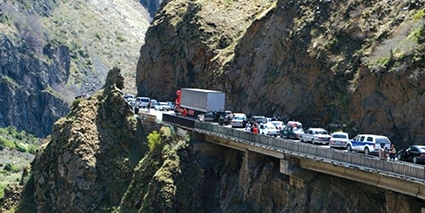Seeking Alternatives: How Can Armenia Transport Cargo to & from Russia?
The initiative to make changes to the Law of Georgia on Occupied Territories has a new story to tell. Alongside those supporting “humanization” from the governmental party are those from the government of our neighboring country. The Prime Minister of Armenia has already begun to convince local importers that an alternative to the military highway connecting Russia and Georgia has been found. Although it was not specified through which geographical point our neighbor plans to transport the cargo from Russia to Georgia if not via the Dariali Gorge, without changes to the Law of Georgia on Occupied Territories, this promise has no grounds and this fact is crystal clear not only to Official Yerevan, but also to Official Moscow and Tbilisi as well.
Our neighbor announced the need for diversification of the transportation corridor connecting it with Russia when a landslide blocked the highway back in summer. Official Yerevan demanded that the Georgian Military Highway in Dariali be substituted by the Roki Tunnel in Javi Gorge. Naturally, this request was met with the relevant reaction. In fact, Prime Minister Kvirikashvili confirmed that certain consultations were attempted in the Abashidze-Karasin format but an agreement could not reached, since the Kremlin raised political demands regarding the status of the occupied region.
The declaration of Armenian Premier Karen Karapetyan that an alternative to the Georgian Military Highway has been found raises the serious suspicion that the “humanization” of the law on occupied territories has nothing to do with caring for the people living in Abkhazia and South Ossetia and serves more the interests of Moscow and Yerevan. The “humanization” means imposing a 400 GEL fine on people who illegally enter the occupied territories. Put simply, if a truck driver moving from Russia to Armenia crosses the Georgian border from the River Psou pass or the Roki Tunnel, he will be obliged to pay 400 GEL in Zugdidi or Gori before being set free to return to his homeland. In contrast, according to the law in force today, the driver will be captured and jailed for four years.
Discussions on finding a substitute to the Georgian Military Highway were heard in summer. The Minister of Transport of Armenia, Gagik Beglaryan, offered a number of alternatives to the Georgian Prime Minister during his visit to Tbilisi, among them the E-60 transit corridor and the Tbilisi-Bakurtsikhe-Lagodekhi route. However, neither of these options has any connection with the Russian border- the first starts in Baku and ends in Poti, while the other crosses the Azerbaijani border. Therefore it is unclear how these make it an alternative to the existing route. Maybe they were discussing the new road coming from Dagestan to Kvareli and joining the Tbilisi-Bakurtsikhe-Lagodekhi route, but nobody specified this. Thus, we can assume that both Yerevan and Tbilisi prefer “humanization” over building new roads and wasting resources.
76 MPs clicking the green button will be enough to make the changes to the law. Former Prime Minister of Georgia Tengiz Sigua excludes finding any reasonable alternative to the current Upper Larsi border crossing point used as the transportation route connecting Russia and Armenia via Georgia. “Armenia can receive cargo from Russia via Georgia only through the Upper Larsi border crossing point; they have no alternative. Iran would let the cargo through, because Russian military cargo goes through the Caspian Sea. However, as far as I know the railway line which carries Russian cargo from Iran to Armenia is so overloaded that it cannot accept any additions,” Sigua said in an interview with Pirveli.
Zaza Jgarkava












